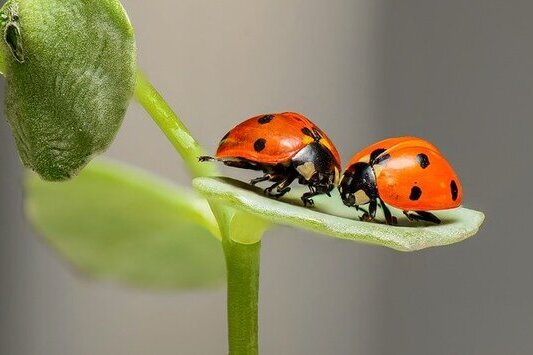Do you know which insects are beneficial for an orchard or garden? Find out here + tips for attracting them

Insects have a bad reputation.
When we think of common insects in our gardens, the first thing that comes to mind are the harmful species: aphids, mealybugs, whiteflies....
But that is only half the picture.
There are many insects that not only do not harm our plants, but are even beneficial to them and can help us keep them healthier.
Do you know what they are?
If not, read on, because here we are going to tell you about the X most interesting insects and how to attract them to your garden.
Here we go.
9 beneficial insects for the vegetable garden that will help keep your plants healthy (and protected!)
9 beneficial insects for the vegetable garden that will help keep your plants healthy (and protected!)
1. Bees
It is no secret that bees are nature's pollinators.
In their search for nectar to produce their delicious honey, bees transport pollen from one flower to another.
Thanks to this process, our plants are able to reproduce and produce their fruits. Hence the importance of having these hard-working little critters in our garden.
Moreover, they are not harmful, and rarely attack.
The best thing is that attracting them is the easiest thing in the world: as long as you have flowering plants in your garden or vegetable garden, sooner or later you will end up receiving their visit.
2. Wasps
Unlike their cousins, the bees, wasps have a rather bad reputation (in many cases undeserved).
But the reality is that they can also be good allies for our plants.
In particular, their presence helps to keep pests under control. And is that wasps lay their eggs inside other insects, including some common (and not so appreciated) of our gardens as:
- Aphids.
- Mealybugs.
- Whiteflies.
- Thus, when the larvae hatch, they feed on the insects that serve as their host.
Not only that, but during their adulthood they also continue feeding on these insects and arachnids.
In other words, they are natural pest controllers.
In addition, some wasp species (such as the fig wasp) also feed on nectar, so they are also involved in pollination.
3. Ladybugs
And speaking of pest eaters.
Ladybugs are famous for being a natural remedy against aphids.
Not only that, but in their menu also enter:
- Larvae of different insects.
- Mealybugs.
- Mites.
- .Et cetera.
In fact, although they don't look like it, ladybugs are very voracious eaters. A single one is capable of devouring thousands of insects during the hottest season (which is when these pests proliferate the most).
If you find one in your garden, treat them with affection, because you will not have better gardening companions.
4. Praying mantis
In addition to being elegant, the praying mantis is a skilled hunter.
It feeds on all kinds of insects, some of them harmful to our plants. For example, among its favorite prey are caterpillars (those so fond of boring holes in our leaves).
Despite what some believe, praying mantises are not poisonous and have no capacity to harm a person.
However, be careful not to get pecked by their legs!
5. Beetles
Among the many species of beetles, some are insectivorous.
That means that their menu includes insects, such as caterpillars and grubs that often eat plant leaves or nibble on grass roots.
By the way, did you know that fireflies are also a type of beetle?
6. Worms
Earthworms are the moles of the insect world.
As they dig in the soil, they leave small tunnels that help prevent compaction and keep the soil spongy and oxygenated. This is very good for plant roots.
In addition, earthworm hummus (the organic material they excrete) is considered one of the best organic fertilizers available.
7. Chrysopas
These flying insects, very common in yards and gardens, are notable for their huge, semi-transparent green wings.
Lacewings feed on small insects, such as aphids, and are voracious eaters.
8. Dragonflies
In addition to being very colorful insects, dragonflies can also help keep other unwanted garden visitors at bay.
Flies and mosquitoes are their favorite food.
If you have mosquitoes in your garden on a regular basis, a couple of dragonflies can save you from many bites.
9. Spiders
One of the most common pests in any garden is the red spider.
However, with this exception, most spider species (which are not insects, but arachnids) are famous for feeding on insects, not plants.
Their webs are perfect for catching many flying insects that would escape others on this list.
How to attract beneficial insects to your plants
Some insects, such as ladybugs, can be introduced “by hand” into your garden or orchard. But others you will have to attract.
The good thing is that doing it is very simple: just group some plants that bugs love to get them to come to your garden.
These are:
- Rosemary: its smell attracts both bees and some predatory insects, which feed on its nectar when pests are not abundant.
- Chamomile: During the spring and summer, the chamomile plant will make the lacewings flock around like crazy (and eat a few aphids in the process).
- Marigold: in addition to having a very showy flowering, marigolds also serve to attract bees and even wasps.
- Fennel: some wasps are attracted to its nectar.
- Basil: in addition to being an excellent food condiment, if you plant it outdoors you will attract bees and some predatory insects.
Did you know all these beneficial insects for the garden?
As they say, nature is wise.
And if we know how to treat and respect it, it will be more than willing to lend us a hand (in this case, through insects like the ones on this list) so that our plants always stay healthy.
We hope you found this article useful.
And remember that, if you have any questions about how to care for your plants, all you have to do is contact us.
We will be happy to help you keep them healthy and happy.

 English
English Spanish
Spanish